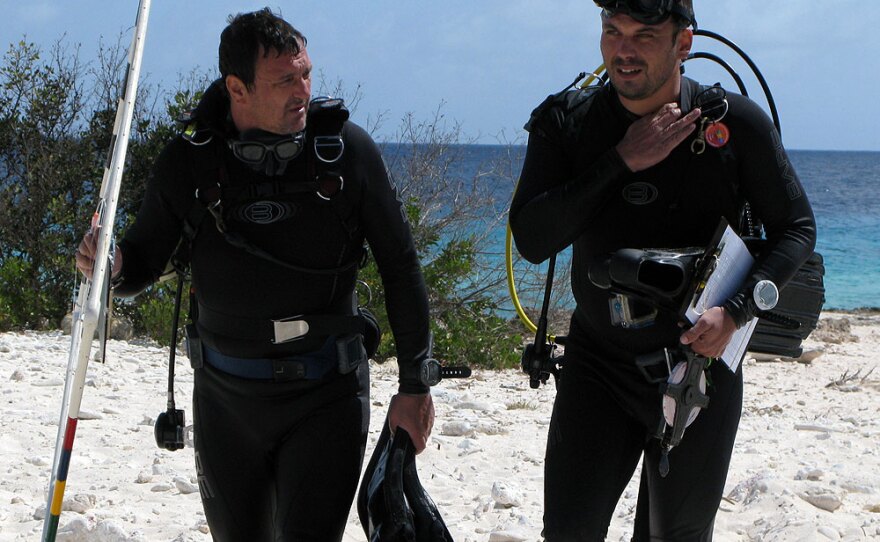Coral reefs are the rain forests of the oceans, teeming with diverse and postcard-perfect fish, towering sponges and multicolored coral. And like rain forests, they are in jeopardy.
Global warming is a long-term threat to the world's coral reefs. And this summer, the risk to Caribbean corals could be acute. Federal scientists warn that the seas could be unusually warm. And warm water can be deadly for corals.
Scientists can't do anything about overheating ocean waters. But they are exploring ways to keep reefs resilient, so they can better withstand heat shock.
This spring, a team of scientists converged on the tiny Caribbean Island of Bonaire to study the reef and understand what keeps it healthy.
The ecology of the reef isn't the only thing at stake — so is the very economy of the island.
"Bonaire is known as a diver's paradise," says Ramon deLeon, who is in charge of the marine park that encircles the island. "Anywhere from 50 to 70 percent of the economy is running on tourism, and 90 percent of the tourism is diving tourism."
A Reef Check-Up
On this balmy evening, deLeon has come to this combination bar and dive shop to meet up with a team of scientists. They plan to spend the next 10 days in the water, to see how the reef is doing.
Gabriel Grimsditch, from the conservation group IUCN, has organized the research. He explains that this is part of a project that's taking place around the globe. It was stimulated by a massive ocean warming episode 11 years ago. Overheated waters worldwide forced the colorful microorganisms that live inside the coral to abandon their homes. The coral turned white — it bleached. And a staggering 16 percent of all the world's coral died off during that episode.
"And it basically got people thinking that climate change was actually one of the most important threats to corals at the moment. So people started looking at why coral reefs recover from bleaching or why they don't."
That's one reason they've come to Bonaire. The reef here was hit hard during the 1998 bleaching episode. Marine biologist Mark Vermeij, from the nearby island of Curacao, remembers it vividly.
"The reef slope actually looked like a mountain slope full of snow. People here were taking their skis out and took pictures for home — like they were skiing the coral reefs."

But much to everybody's relief, the coral here didn't die off. The live-in microorganisms eventually returned to the mineral coral skeletons. The reef regained its color and came back to life.
Too Many Nutrients
The next day, the biologists take their first dive. It's right off one of the many resorts on Bonaire. Ramon deLeon squeezes into his wetsuit and straps on a 35-pound tank.
Clipboard in one hand, measuring square in the other, deLeon trudges across a small beach of imported sand and leads his colleagues into the water.
This resort looks idyllic — the sand, palm trees, a tiki hut bar. But as Mark Vermeij emerges from the dive an hour later, he says the reef offshore looks bad.
"This is not something you get happy about, that's for sure," he says. Many of the corals had toppled over — the result of Tropical Storm Omar last October.
That in itself shouldn't be such a big deal. Reefs have been clobbered by storms for millions of years, and recovered. But Vermeij says the added stress of living alongside human beings made it hard for this reef to bounce back. For one thing, nutrient runoff from the resort's lush gardens have encouraged green algae to smother the coral in places.
"You hit them once and everything else follows. Algal overgrowth, diseases, death by a thousand cuts. That's what this is, right here."
Pinpointing The Problems
Study coordinator Gabriel Grimsditch says pinpointing the problems — and eliminating the causes — can actually help corals to recover from bleaching and natural disturbances.
"We're trying to give [park manager Ramon deLeon] some data he can point to so he can tell people the reef is being affected in this way. And there are certain actions you can take to improve the resilience of the reef."
We clamber into one of the park's well worn pick-up trucks and drive along the narrow island roads. This is actually a desert island, as in arid. But people want it to look like the classic Caribbean paradise, so they plant coconut palms and other vegetation. Then they water. And the water rushes through the porous soils, sweeping nutrients with it.
"These nutrients will end up, sooner or later, in the reef," de Leon says.
Nobody wants to hurt the reef, he says. On the other hand, nobody really wants to hear from the park manager that they need to change their ways.
"Sometimes you have to point fingers and say: 'This is the problem. You are the cause. You have to solve it,'" deLeon says. "Nobody likes that so we have to do it very carefully. But overall I think people appreciate what we do for the coral reef here."
Signs Of Hope
Since deLeon came to Bonaire 11 years ago from Uruguay, he's been telling people that if they care about the reef, they need to think differently about everything from coastal development and irrigation, to fishing.
And when he wants to show off just how healthy a reef can be, he takes people to one of the island's more remote and unpopulated dive spots.
In fact, the science team heads to one of those pristine sites the next day. An island mockingbird calls down from a cactus as the divers gear up.
Once again, the divers disappear beneath the waves. But this time, when Mark Vermeij comes back, he looks happier. This reef, he says, is "orders of magnitudes better" than the one at the resort.
Vermeij says the reef here felt the impact of the same storm that caused so much damage down the coast last fall."The place got hammered like hell, but it's grown back like hell, too," he says.
Everything that should be working to help the reef recover is working here, he says.
Coral "that were lying on the ground are growing back. There are lots of parrotfish. Everybody's happy. But, yeah, it doesn't result in a postcard reef sort of thing. No. Resilience: the ability to come back after you got kicked very hard. This is the place where it actually works like that."
The lesson here is clear. A reef that's healthy to begin with can rebound. So, he says, to help these rich and abundant ecosystems survive global warming, we need to reduce the stresses that are on them now.
Copyright 2022 NPR. To see more, visit https://www.npr.org. 9(MDAzMjM2NDYzMDEyMzc1Njk5NjAxNzY3OQ001))






